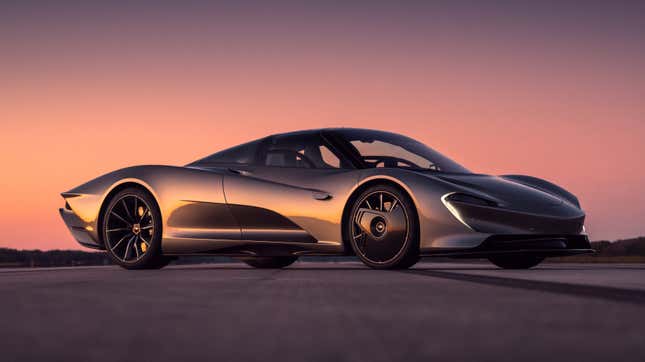
McLaren is not known for taking the easy way out of anything. This is a company that sold a car with a gold-plated engine bay for functionality, not just cosmetics. And now it thinks developing a car with synthetic fuel may be a suitable alternative to going fully electric.
Fuel-powered cars aren’t going anywhere overnight. There’s a lot of metal moving around on four wheels in the world, and since conversion to an electric powertrain isn’t easy at all, there’s a big problem brewing once the electric revolution has taken full effect.
Environmental activism has led to policy change, which has led to pressure and incentives from governments for automakers to start building electric vehicles sooner rather than later. But that also comes with its own challenges and shortcomings, and there’s a growing consensus that electric vehicles won’t be the end-all be-all replacement for traditional combustion cars.
For some companies, including Toyota, Honda, and Hyundai, among others, one future solution may be hydrogen fuel. But that’s costly to produce in a consumable form, and the process still isn’t efficient enough to justify on the scale of a true full-production car.
For McLaren, the solution may be synthetic fuel that can be used in traditional combustion-engine vehicles with only minor modifications. Here’s more from Autocar:
McLaren is advancing plans to create a development car that runs on synthetic fuel to prove the technology’s validity as an alternative to battery-electric vehicles for lowering the ecological impact of motoring, COO Jens Ludmann has revealed.
While the project is still in the planning stage, Ludmann revealed that the company believes synthetic fuels can be a viable alternative to electric power if the production of batteries is included as part of an EV’s total CO2 impact.
Ludmann said: “The technology around synthetic fuels is still being developed, but if you consider that it can be produced using solar energy, easily transported and then pumped [into cars] as we know today, there are potential benefits in terms of emissions and practicality that I’m keen to explore. “Today’s engines would need only small modifications, and I would like to see this technology get some more airtime.”
First I just want to say the CEO’s suggestion that the “production of batteries” contributing negatively to a car’s lifetime emissions has been debunked many times before. The Union of Concerned Scientists found in 2015 that it would take an electric vehicle 10 fewer months to offset its production emissions than a traditionally-powered vehicle.
So the rationale may not be based in fact, exactly, but to create a new fuel that could easily swap into cars today and have it be at least as efficient as an electric car over its lifetime, would be a huge deal and major success, and likely what we should actually adopt to avoid a complete infrastructure meltdown as gas stations shutter and power stations grow.
The only problem is this magic synthetic fuel doesn’t exist yet, may not ever exist, and McLaren doesn’t know when it might work. And I bet EVs will have a leg up on short-distance performance and maybe reliability, too. A lot here to think about.